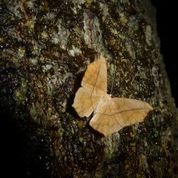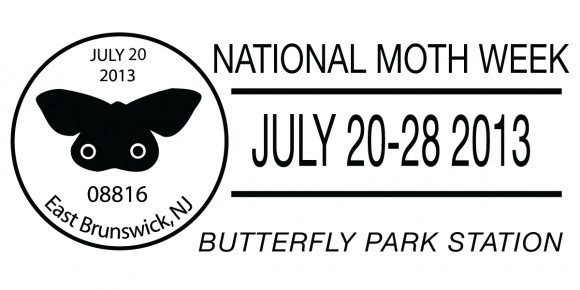 National Moth Week 2013, July 20-28, will kick off in East Brunswick, N.J., where it was founded last year and quickly went global, engaging citizen scientists around the world in observing and documenting moths in their backyards, parks and communities. As of July 9, all 50 US states will be participating in National Moth Week, with various organizations sponsoring events across the country.
National Moth Week 2013, July 20-28, will kick off in East Brunswick, N.J., where it was founded last year and quickly went global, engaging citizen scientists around the world in observing and documenting moths in their backyards, parks and communities. As of July 9, all 50 US states will be participating in National Moth Week, with various organizations sponsoring events across the country.
The Friends of the East Brunswick Environmental Commission (EBEC), which started and runs National Moth Week, will host a caterpillar hunt, moth night and special United States Postal Service event on Saturday, July 20. The founders of National Moth Week are all tied to Rutgers: naturalist David Moskowitz is completing a Ph.D. in Entomology at the School of Environmental and Biological Sciences and Liti Haramaty is a marine sciences researcher at Rutgers Institute of Marine and Coastal Sciences. Moskowitz, Haramaty and several others with Rutgers connections are involved with EBEC and have turned local Moth Nights into a national spotlight on moths.
The events on Saturday will take place in Butterfly Park in East Brunswick, beginning with the caterpillar hunt and butterfly walk for all ages at 10 a.m.
From 10 a.m. to 1 p.m., the U.S. Postal Service will staff a temporary Butterfly Park Postal Station to cancel stamped envelopes brought by the public with a special cancellation commemorating National Moth Week. The commemorative cancellation also will be available through mid-August by sending stamped, addressed envelopes to the East Brunswick Post Office to be cancelled and mailed.
At 8:30 p.m., the Friends of EBEC will hold a “moth night” in Butterfly Park. White sheets and mercury vapor lights will be set up and trees painted with a sweet bait to attract moths. Adults and children are welcome and should wear comfortable shoes and bring flashlights for walking in the woods.
Individuals, families and organizations in nearly every state and more than 30 countries will join the Friends of EBEC from July 20 through 28 in hosting moth-spotting and educational events.

Moth Night in East Brunswick involves attracting moths using a white sheet and mercury vapor lights. Photo credit: Liti Haramaty.
National Moth Week grew out of summer “Moth Nights” organized since 2005 by the Friends, a nonprofit organization dedicated to local environmental education and conservation. The project literally shines a much-needed spotlight on moths and their ecological importance as well as their biodiversity and allows people of all ages and abilities to become “citizen scientists” and contribute scientific data about moths to National Moth Week’s partner organizations.
In the U.S., public moth-spotting and educational events are planned in museums, parks, nature centers, wildlife refuges and libraries, and at universities, colleges and summer camps. See locations of U.S. events and international events.

Trees are painted with a sweet bait of fermented sugar, molasses and beer to attract moths. Photo credit: Liti Haramaty
Why moths? Moths are part of the Lepidoptera insect order, but don’t get the same respect or admiration that their colorful daytime cousins – butterflies – do. Yet, there are hundreds of thousands of moth species, many as beautiful as butterflies, and just as important or more to the ecosystem. Moths also can tell us a lot about our changing environment by their geographical and seasonal distribution.
Participating in National Moth Week can be as simple as turning on a porch light at night and watching what happens, or going outside in daylight to find caterpillars and diurnal moths, often mistaken for butterflies. At night, participants can use ordinary light bulbs, UV lights, or mercury vapor lights to draw moths. And, they can also mix up a batch of sweet moth bait to brush on tree barks for an even bigger response.
It’s free to participate in National Moth Week. To register an event or see where local events are being held, go to nationalmothweek.org.


